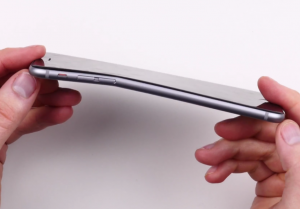The newest hashtag that is taking the Twitisphere by storm is #BendGate which was created to mock the new iPhone models. Earlier this week Apple released two new phones, the iPhone 6 and the iPhone 6 Plus. This year’s models boasted a bigger 4.7-inch (iPhone 6) and 5.5-inch (iPhone 6 Plus) display and an astonishing thinness of 6.9mm and 7.1 mm respectively. However, it did not take long for consumers to discover a major flaw that could seriously effect sales as well as Apple’s reputation.
Thousands of users across the world have reported that their new iPhone’s have bent after being kept in pockets for extended periods of time. As a long time fan of Apple products, I am rather shocked that Apple did not foresee this defect. Apple has a Value Proposition which promises high build quality in all of their products. However, with the discovery of this, the quality of Apple’s production is put into question.
iPhone 6 Plus Bend Test – Video Courtesy of Unbox Therapy
With the release of the Apple watch in early 2015, it is likely that the buzz around the iPhone 6 will have an affect on sales of the new watch. How will Apple recover from this tragic discovery? Only time will tell.
